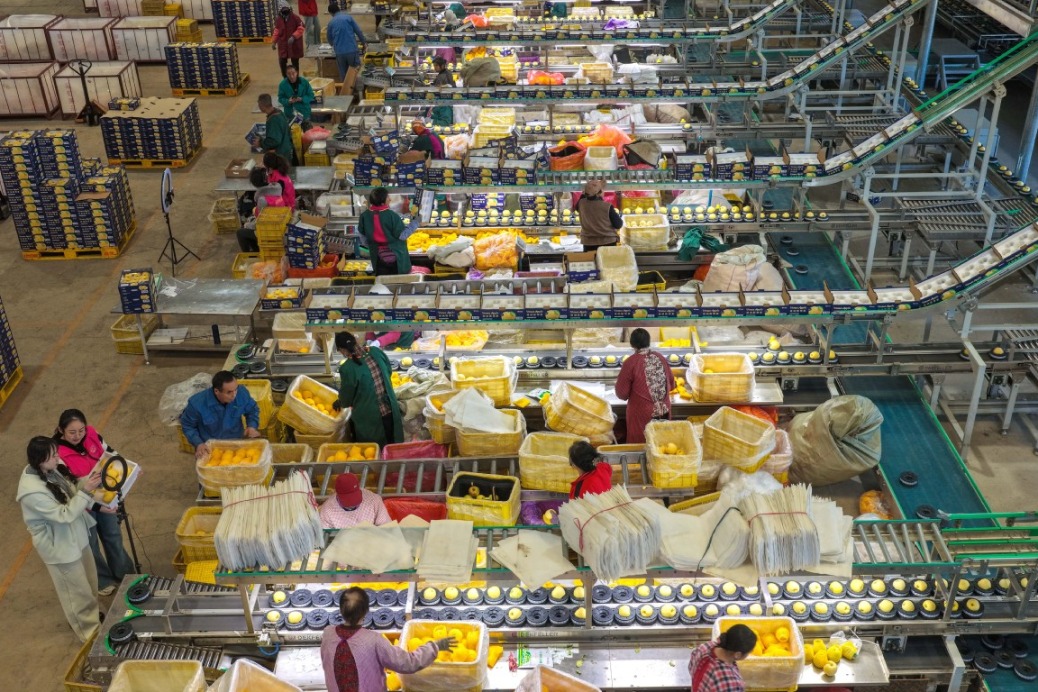Sino-African ties to prosper


China-Africa relations hold great promise, especially for Africa's development. China's industrialization process which stimulated growth and employment is particularly attractive to African countries since many of them are exploring a path to structural diversification – to transition from their dependence on primary production (mining) to manufacturing and services.
China is seen as an important country by Africa, not least because it is the most significant trade partner of the continent. China's engagement with African countries has been shaped by friendship, trust and mutual respect. For this relationship to further prosper, the two sides need to make greater efforts to boost two-way trade.
African countries need to strengthen their ability to participate in global value chains, and at multilateral levels to more actively influence the terms of trade. African leaders must use platforms such as the Forum on China-Africa Cooperation to negotiate equitable trade. And African decision-makers must use their agency more effectively and leverage the special bond they enjoy with China to expand the two-way trade.
African leaders also need to deepen collaborative relationships through processes such as the African Continental Free Trade Agreement, which is now being operationalized, and shore up domestic institutional capabilities, improve their production profile, promote innovation, and negotiate with external partners on a sounder institutional and economic basis.
The United States, for example, has been testing the trade waters in Africa by negotiating a free trade agreement with Kenya. China could consider going a step further to explore a bilateral free trade agreement with the AfCFTA. This is likely to take longer, and be fraught with difficulties related to tariff harmonization and rules of origins, but it could help expand trading opportunities for both sides.
The European Union showed back in 2005 that it is possible to negotiate region-wide trade arrangements when it introduced the Economic Partnership Agreements. Granted, it was negotiated along reconfigured regional economic communities. But there is much to be learned from those negotiations with a view to generating more meaningful gains for African countries.
Beyond opportunities in trade negotiations, there are other instruments that could be built upon to realize greater developmental gains, including FOCAC and the Belt and Road Initiative.
FOCAC and the BRICS mechanism, comprising Brazil, Russia, India, China and South Africa, are directed at a tier of mostly low-income and emerging economies. The potentials of these institutions need to be fully exploited.
China has been promoting FOCAC since 2000. The initiative has helped to expand and deepen China's footprint on the African continent. China has, no doubt, contributed positively to Africa's development since the founding of FOCAC. This contribution is especially pronounced in areas such as debt cancellation for heavily indebted poor countries, provision of training for African professionals, the extension of credit lines to African governments, and cooperation across a range of dimensions, including education, science and technology, agriculture, public health, and security. These initiatives have cast China in a positive light in Africa.
China made the most far-reaching commitments at the sixth FOCAC Summit in South Africa in December 2015, and followed it up by similar commitments at the seventh summit in Beijing in 2018. In South Africa, President Xi Jinping announced a $60 billion package for financing 10 significant initiatives. This package included $10 billion for a fund dedicated to building industrial capacity and investment in manufacturing, high-tech, agriculture, energy and infrastructure. In addition, there was $5 billion for aid and interest-free loans and $35 billion for export credits and preferential loans.
Through initiatives such as FOCAC, China can use Africa as an avenue for bolstering its global profile. Moreover, FOCAC can help establish a single, favorable perspective on China for the entire continent, even if such a goal is tenuous, because there are still divergent views about China in Africa. As Shaun Breslin, one of the leading scholars on China's role in the global economy, has said, the country has also positioned itself as a relatable standard-bearer of an alternative development approach that African countries can learn from.
Xi proposed the Belt and Road Initiative in 2013, which consists of a series of bilateral agreements signed between China and other countries for development and the financing of different infrastructure projects. Since Africa has an infrastructure financing deficit of about $100 billion a year, China can play a key role in supporting the continent's infrastructure revolution, including digital transformation.
As far as the US is concerned, negative sentiments about China's commercial diplomacy are ingrained in American politics and will likely deepen under the Joe Biden administration. For example, in April, US Senate Foreign Relations Committee members introduced measures aimed at countering China's global influence by highlighting strong human rights conditions in Belt and Road projects and recommending a budget allocation of $655 million to undermine the Belt and Road Initiative.
Deborah Brautigam, a leading scholar on Chinese trade and investment activities, has sought to debunk the myth about the Belt and Road Initiative as China's strategy to get developing countries indebted, and upon default, lay a claim on their natural resources. Brautigam draws on extensive research to show that Chinese banks are willing to restructure the terms of existing loans, and that there is no evidence of China having seized any assets from a defaulting country.
This, however, requires serious attention because perceptions do matter in international relations. There has to be active and effective communication in order to empower citizens with accurate information and to increase transparency which is essential for building public trust.
There are great opportunities to leverage China-Africa relations, from scientific collaboration, skills development, mutually beneficial trade, promotion of multilateralism and, most importantly, fostering greater people-to-people contact.
China and Africa need to invest more in fostering contact between their youth who will take forward the commitment to build stronger and equitable relations. The opportunity presented by the celebrations of the centenary of the Communist Party of China should be maximized in order to deepen solidarity and cooperation. This article, therefore, in part pays tribute to the achievements of the CPC over the last century and in particular, its success in pushing back the frontiers of poverty.
Mzukisi Qobo is the head of Wits School of Governance, and Busani Ngcaweni is a visiting professor at the Wits School of Governance, University of Witwatersrand, Johannesburg. The views don't necessarily reflect those of China Daily.


































